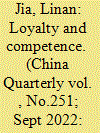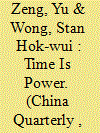| Srl | Item |
| 1 |
ID:
186940


|
|
|
|
|
| Summary/Abstract |
Scholarly debate on the role of various contributing factors in cadre promotion yields conflicting evidence for different administrative levels in China, yet rarely has any quantitative evidence been presented for below the county level. This study explores the causal relationship between loyalty, competence and promotion at the township level. Based on an original dataset of local cadre training records, this paper utilizes cadres’ training experience at Party schools and academic institutions to account for loyalty and competence at the local level. Using a rigorous data-preprocessing method – coarsened exact matching (CEM) – this paper explores the causal effects of cadre training on promotion. The empirical results show that Party school training significantly increases the probability of promotion for township-level cadres, while university training contributes to chances of promotion to a lesser but indispensable degree. Moreover, local cadres who are both Party school and university trained enjoy the best chances of promotion.
|
|
|
|
|
|
|
|
|
|
|
|
|
|
|
|
| 2 |
ID:
178884


|
|
|
|
|
| Summary/Abstract |
Whether local officials in China are promoted on a meritocratic basis has been the subject of long-standing debate. Merit is commonly gauged by a leader's ability to deliver local GDP growth. Although some find economic performance to be a strong predictor of the career success of local leaders, we argue that the existing measure, which focuses on the promotion outcome of a single career step, is problematic because the career success of individual local leaders is seldom determined by a single promotion, or the lack thereof. We propose an alternative measure that is more suitable for China's political context: the length of time until promotion. Analysing the time it takes to gain promotion for four types of local leaders, we find that good economic performance is associated with a shorter time until promotion. However, the cumulative time-reducing effect of economic performance is far from significant, as it is generally insufficient to help local leaders overcome the age ceiling for promotion.
|
|
|
|
|
|
|
|
|
|
|
|
|
|
|
|